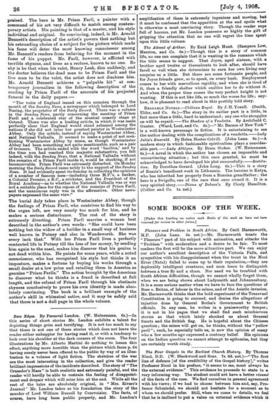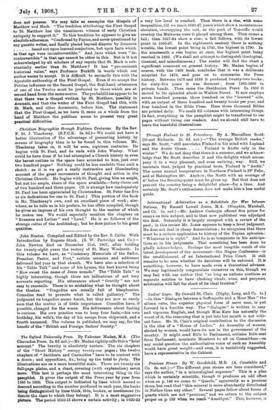The Pour Gospels in the Earliest Church History. By Thomas
Nicol, D.D. (W. Blackwood and Sons. 7s. ed. net.)—" The first line of defence [of the credibility of the Gospel history]," writes Professor Nicol in his preface, "it seems to me, must always be the external evidence." This evidence he proceeds to state in a very informing way. The student could not have a better résumé of the facts of the case. We find ourselves in general agreement with his views; if we had to choose between him and, say, Pro- fessor Schiniedel, we should not hesitate for a moment as to whom we should prefer. Still, when we come to details, we feel that he is inclined to put a value on external evidence which it
does not possess. We may take as examples the Gospels of Matthew and Mark. "The tradition attributing the First Gospel to St. Matthew has the unanimous witness of early Christian antiquity to support it." To this tradition he appears to give an absolute adherence. "Confirmed by Papias, and never questioned by any gnostic writer, and finally placed beyond dispute by Irenaeus
based not upon learned conjecture, but upon facts which in that age were incontrovertible." And facts which were "in- controvertible" in that age cannot be other in this. But is it not acknowledged by all scholars of any repute that St. Mark is sub- stantially earlier than St. Matthew ? It has "pro-eminent historical value," says Professor Burkitt in words which our author seems to accept. It is difficult to reconcile this with the Apostolic authorship of the First Gospel. Even if we accept the Petrine influence on the Second Gospel, the first-hand utterances of one of the Twelve must be preferred to those which are at second hand from the same source. The probabilities appear to be that there was a Gospel written by St. Matthew, possibly in Aramaic, and that the writer of the First Gospel had this, with St. Mark, and other documents, before him. The statement that the First Gospel, as we have it, came as a whole from the hand of Matthew the publican seems to present very great practical difficulties.



















































 Previous page
Previous page